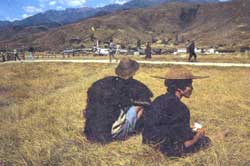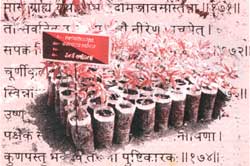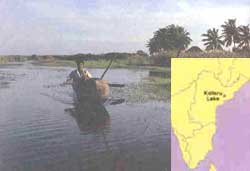
Virus on prowl
A virus is being used to cull the rabbit population in Australia. But will it affect other animals and spoil the ecosystem?

A virus is being used to cull the rabbit population in Australia. But will it affect other animals and spoil the ecosystem?

About 90 per cent of Arunachal Pradesh"s revenue is generated by its forests. Yet these very forests are under heavy pressure, thanks to the lucrative and often illegal timber trade thriving under political patronage

Even as microbes -silent and efficient behind-the-screen contributors to the ecosystem -continue to revel under the spotlight abroad, in India, it has yet to acquire its due importance. Indian germplasm, aided by non-existence of biodiversity conser

A haze of pollutants, the size of the US, covers a part of the Indian Ocean sky creating fears of acid rain, low rainfall and a change in environmental politics

The culture of `businesslike" individual enterprise is playing havoc with the age-old collective wisdom of communities that plan for the common good

Ours is a corporate age. And amid the fertile arguments on how to tame and transform today's corporation, there is a sense that current era of business dominance is somehow unique. But there was a time when corporations really ruled the world, and among

The Gloria Land farm in Pondicherry and another run by a couple in Karnataka, show natural inputs can effectively replace factory produced fertilisers and pesticides.

A recent congress highlighted the relevance of people oriented science and technology such as the management of water, forests and agriculture.

A sturdy mountain tree could transform chilly deserts into lush fields

The search for easily applicable environment-friendly plant protection technologies could very well find its answer in the pages of history
RECENTLY, the Rajasthan High Court, concerned about lesser tigers in the Ranthambore tiger reserve, directed that all vehicles should be denied entry into the park. The response was immediate and
<h2 class="title " style="margin-bottom: 0px; color: rgb(0, 0, 0); font-size: 22px; margin-top: 5px; font-family: arial; padding-left: 15px; padding-top: 10px !important; border-top-width: 0px !important;
<div> <strong>What happened to our right to CLEAN AIR! </strong></div> <div> </div> <div> Our campaign started with blowing the lid on smog and exposing the smogmakers in a city where

Droughts seem to be here to stay. Wrong development policies, governmental indifference and relief schemes which don't work have led to a situation where a large part of the nation faces scarcity despite a year of almost normal rainfall
<p><span style="font-size: small;"><span style="font-family: Verdana;"><b>Monday, December 14, 2009</b>: Standing in line in the freezing cold, waiting to be registered to the conference of parties to the climate change convention being held in Copenhagen, I have strange sense of foreboding that this will be an eventful but disappointing week.

A pristine lake that once drew birds of several species today lies clogged with weeds, a victim of unplanned economic development.

Conservation policies practised in the developing world need to tread cautiously on territories which had for generations, belonged to the people, says a statement by the Centre for Science and Environment

Western institutions and the United Nations are keen protagonists of natural resource accounting but it may still not be a useful policy tool for planners to promote sustainable development. Experience in the Philippines has shown that only an elaborate c

Pollinators, small insects like bees and butterflies, animals like bats and small birds such as the hummingbird, play a big role in helping plants propagate. Their populations are declining rapidly. If they die out, so will the plants that depend on them

Indigenous peoples of the world have been objects of downright apathy and brutal repression at worst, and mild tourist or academic interest at best for years. Today, they are fighting to overcome the shadows that dog their collective existence. And the wo